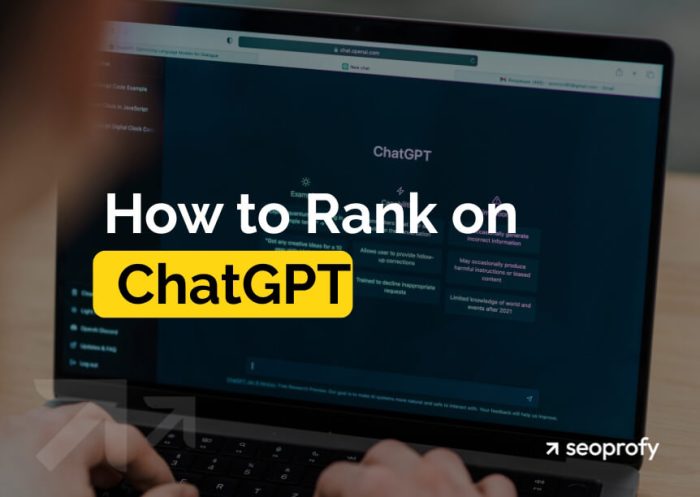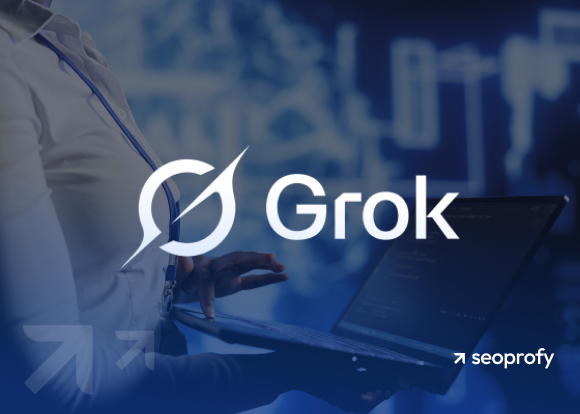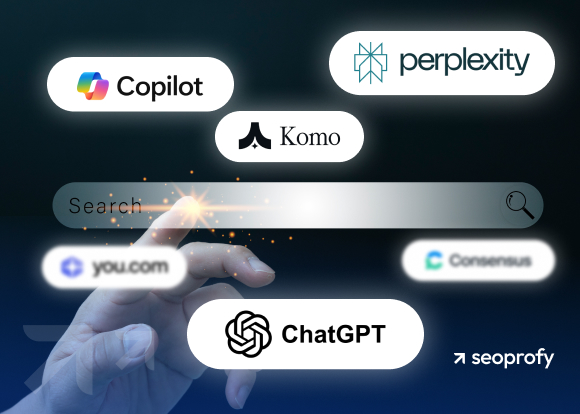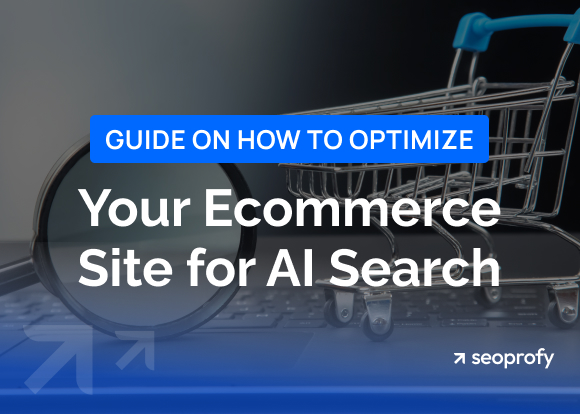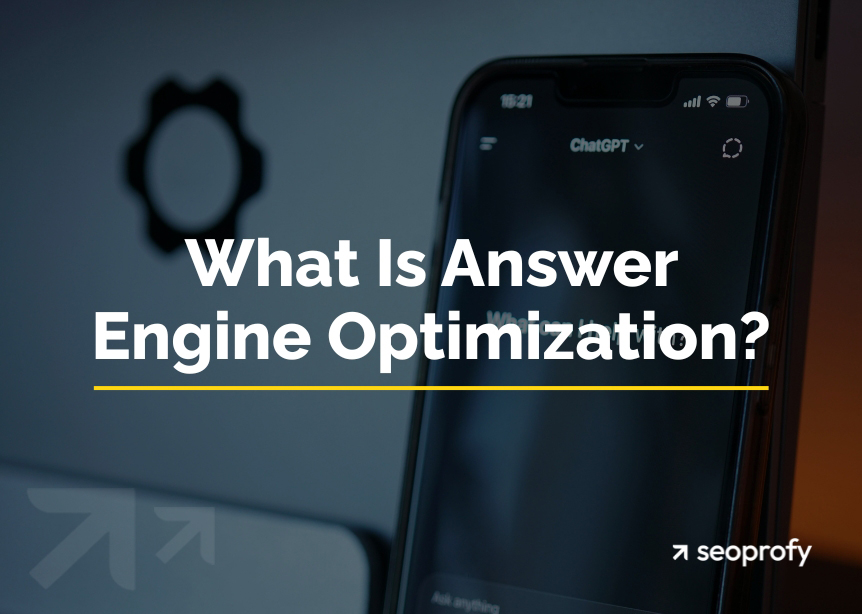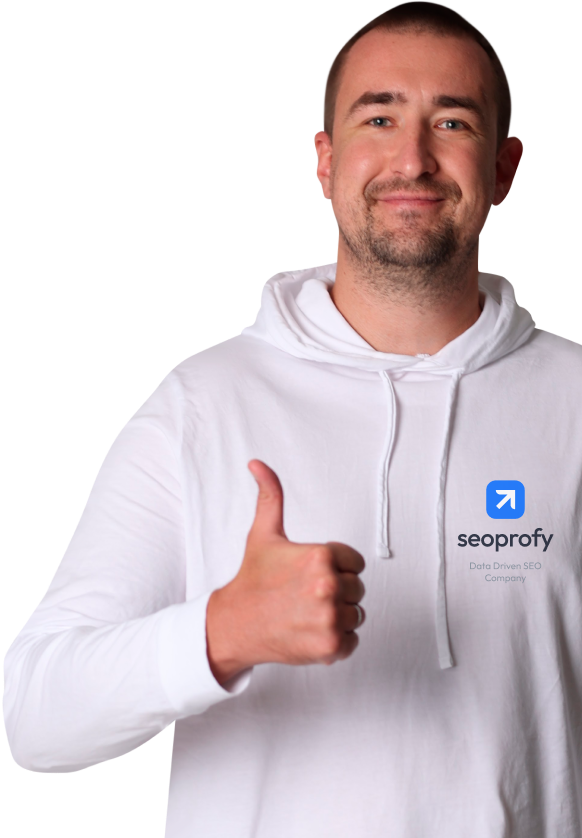To rank well on ChatGPT, create high-quality content that’s relevant and clearly answers user questions. Make sure AI crawlers can easily access your pages, and strengthen your brand’s presence through mentions on trusted sources and positive reviews online.
ChatGPT now serves nearly 800 million weekly active users and is one of the fastest-growing search engines in B2B. People use it to get personalized recommendations for all kinds of products and services. As more users turn to this AI model, many businesses ask: How to rank well on ChatGPT results?
In this guide, we’ll share with you some data-backed strategies that will help you increase brand mentions in AI systems. You’ll learn actionable tips you can start implementing right away to get more visibility and organic traffic from ChatGPT and other large language models.
- ChatGPT surfaces brands based on relevance, credibility, and how often they’re mentioned across trusted online sources.
- Studies show that 61% of pages cited by ChatGPT used schema markup, which shows that structured content is more likely to be referenced in AI models.
- Growing your presence in AI search requires a more diverse content strategy that expands into Reddit marketing, social media, and PR.
- Brand mentions in Reddit, Quora, and comparison articles signal to LLMs that your site is authoritative and trustworthy and improve the chances that the model will use your brand in its answers.
Why Is Ranking on ChatGPT Important?
Even though Google owns about 90% of the search engine market share, the growth of ChatGPT is hard to ignore. It surpassed 5.4 billion visits in June this year and continues to gain new users.
This alone shows that building an SEO campaign strategy around this platform can give your brand a huge advantage in terms of visibility, referral traffic, and even your bottom line.
When your name shows up in ChatGPT answers, people tend to see it as credible and reliable. For businesses, it means you can reach your target audience who are asking specific questions about your products or services inside the chat.
With these clear benefits, what exactly influences your rankings in ChatGPT in comparison to other search engines? Let’s find out in our next section.
How Do ChatGPT Algorithms Work?
ChatGPT’s core answers are generated from training data, but the browsing-enabled version uses Bing Search to pull current content. If your site ranks on Bing and is frequently mentioned in public sources, those mentions may influence ChatGPT responses.
In some cases, like when browsing is enabled, ChatGPT uses Bing’s search index to bring in current information. So if your content ranks in Bing and gets mentioned across public sources, that data becomes part of the model’s input.
That said, let’s look at certain factors that determine which brands ChatGPT shows in its responses:
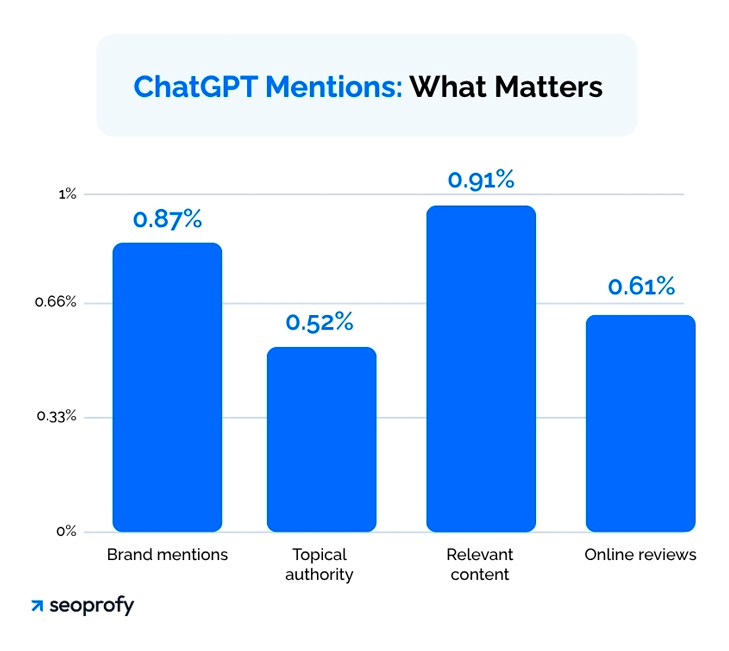
- Brand mentions: Consistent mentions of your brand in articles, forums, product listings, and community discussions help ChatGPT recognize your brand as credible and relevant to user questions. This connection increases the likelihood that your brand will be included in responses to related queries.
- Topical authority: Brands that publish content around their subject area and cross-link related pages signal to ChatGPT that they have deep expertise on the topic. This helps the model see the brand as a trusted and credible source.
- Relevant content: The model looks for content that matches the question being asked. That means your page has to align with how people phrase queries. The closer your language is to the way people search or ask inside the chat, the better.
- Online reviews: When your brand has lots of detailed and positive reviews across different platforms, that information gets embedded into the model’s knowledge. That, in turn, helps ChatGPT connect your brand with the products or services users inquire about and see it as trustworthy.
6 Strategies to Rank on ChatGPT
Now that you know how ChatGPT decides which brands to show, here are seven strategies to help you appear more often in its answers.
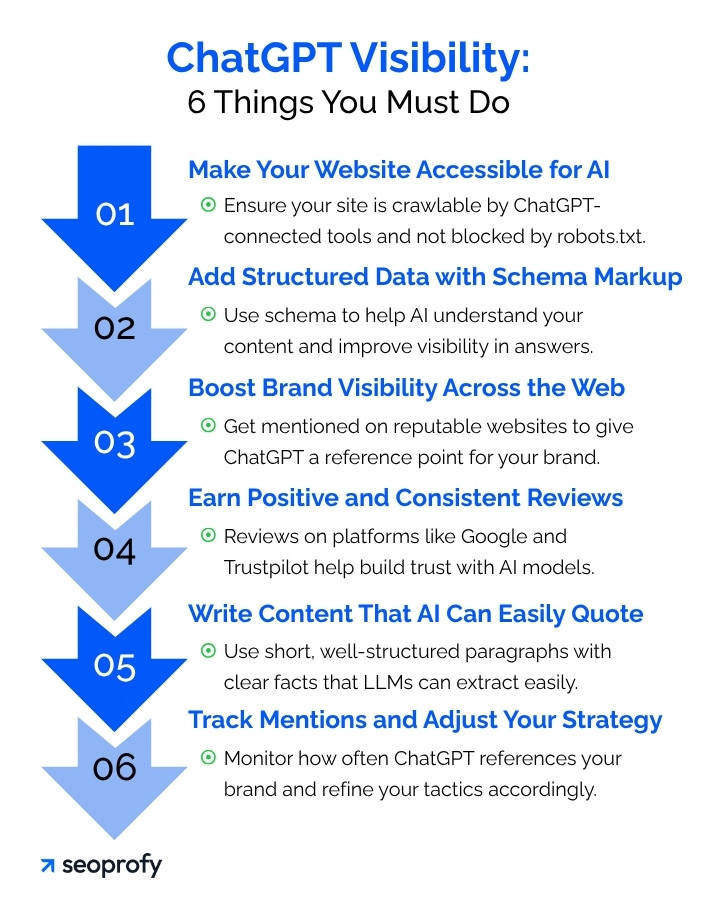
1. Make Sure Your Website Is Accessible to ChatGPT
Before anything else, your content has to be accessible to AI crawlers that collect data for training models like ChatGPT. If these crawlers can’t access your pages, your content won’t be included and won’t show up in AI responses.
The first thing you need to do is check your robots.txt file and Cloudflare settings. Sometimes companies unknowingly disallow OpenAI or other AI crawlers, which makes their pages invisible to the model. Here’s how to check it:
- Open yourdomain.com/robots.txt and review the file. On Google Cloud Storage, upload the robots.txt file directly to the bucket root and make sure it’s publicly accessible.
- Go to your settings in Cloudflare (or whichever CDN or security tool you use). Under Security > Bots, confirm that tools like OpenAI and other LLMs aren’t being blocked under your bot protection rules.
- If you’re using a CMS like WordPress, the robots.txt is often dynamically generated, and you manage it through plugins like Rank Math or Yoast or via server rules (Nginx or Apache).
Once you’ve confirmed that AI bots can access your content, the next step is to add schema markup to your pages.
2. Use Structured Data to Rank Higher in AI Search
Most marketers already know that structured data helps Google understand website content better. But far fewer realize how important it is for large language models.
AirOps recently analyzed more than 15,000 URLs and found that 61% of the pages ChatGPT cited included rich schema markup, while only 25% of Google’s top search results had it.
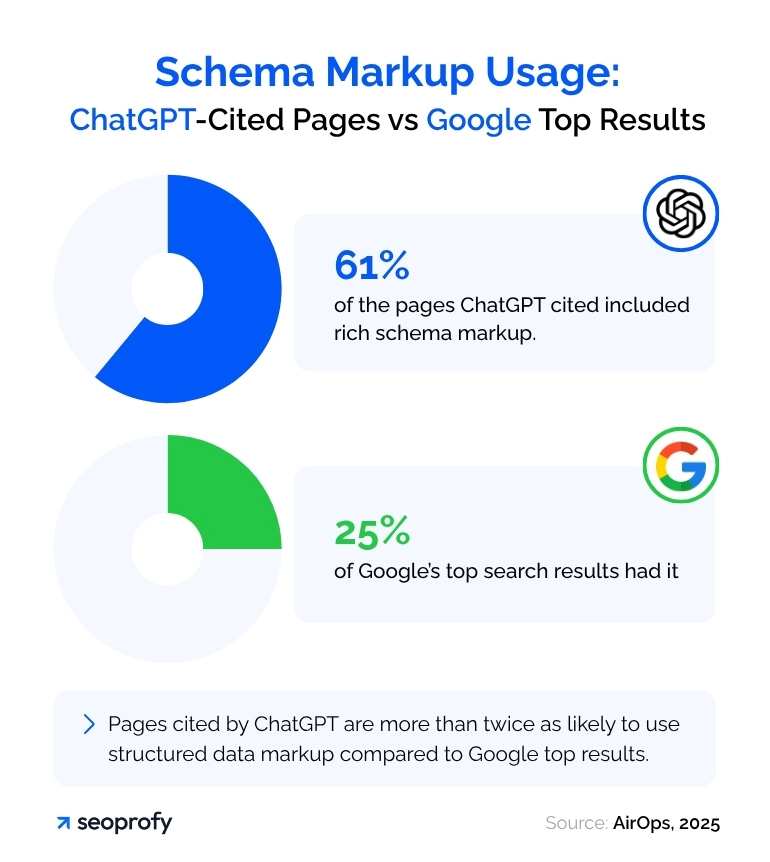
This is mostly because schema markup turns your page into a format machines can easily interpret. It tells AI tools exactly what each part of your content means, so they can confidently pull the right information into answers.
So if your goal is to rank higher in ChatGPT search results, adding schema markup gives you a major advantage. Here are the most common types of structured data you can add to your content:
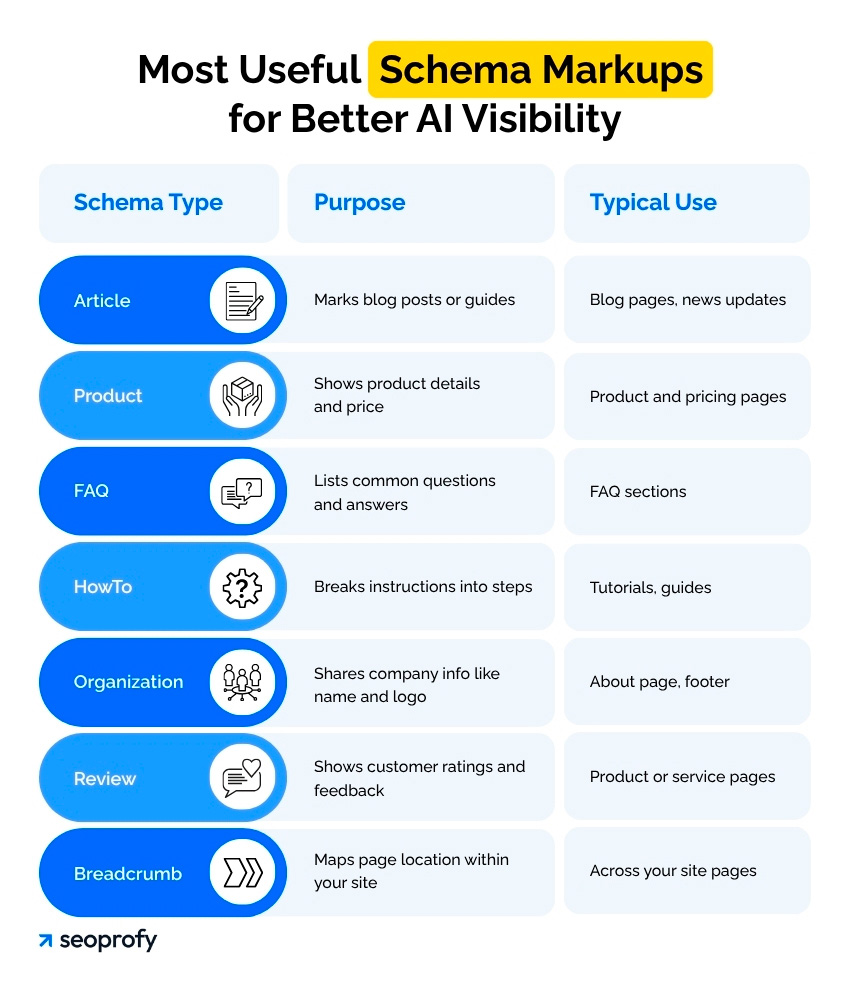
To implement these schema types on your pages, you’ll need to insert JSON-LD code into your HTML. There’s a tool called Google’s Markup Helper that can help you create this code. And to check if it’s working, you can use the Rich Results Test.
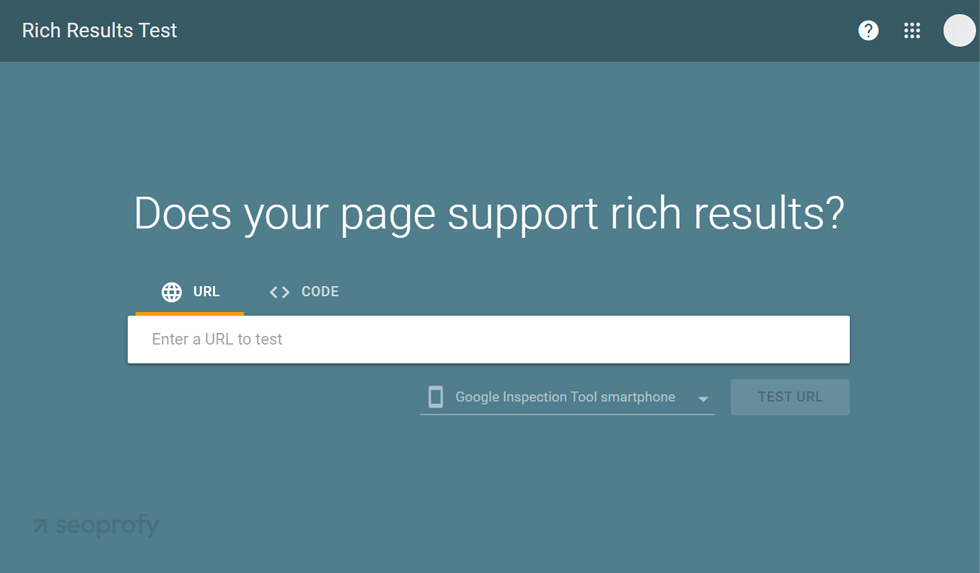
3. Build a Strong Brand Reputation
In comparison to traditional search engines, ChatGPT uses its own pre-trained data and external sources to respond to user queries. So if your brand hasn’t been mentioned often in the types of websites ChatGPT has been exposed to, then the model has no reference point for it. How to fix it?
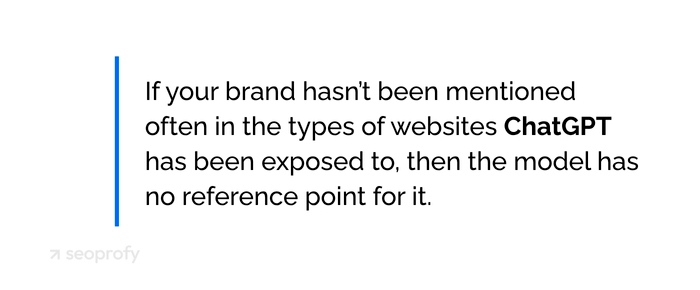
Work on Your Digital PR and Backlinks
For AI tools, brand mentions work kind of like backlinks do for Google. Every time your name comes up in a Reddit thread, online review, or relevant article, it sends trust signals to LLMs and helps your brand rank in ChatGPT search results.
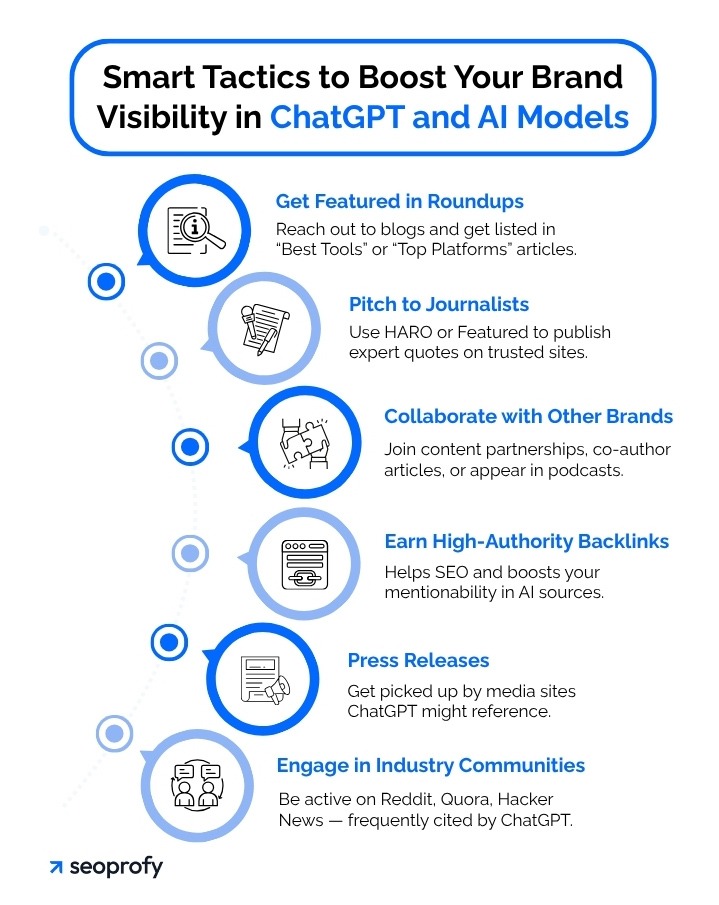
The best way to get other people to talk about you is through digital PR and link building. Here are a few effective tactics to include when creating an SEO strategy for your company:
- Get featured in roundups or comparison articles: Reach out to blogs or publishers in your industry and ask to be included. “Best tools for X” or “Top platforms for Y” lists are often pulled into AI answers.
- Pitch your story to journalists: Use platforms like Help a Reporter Out (HARO) or Featured to contribute expert quotes or stories. These often get published on trusted sites and picked up by AI models later on.
- Collaborate with others in your space: Partner with other brands, co-author content, or join podcasts and webinars. The more your brand appears in different contexts, the stronger the signal.
- Secure backlinks from high-authority sites: This helps both SEO rankings and mentions in AI platforms because these sites can be part of ChatGPT’s training data and context sources.
- Get mentioned in press releases or announcements: If you’re launching a new feature, distribute it through PR services to get a mention from major media websites that the model may reference.
- Be active in industry communities: Answer questions or share ideas around your business on Reddit, Quora, Hacker News, or niche Slack groups. By the way, Reddit is the 2nd most cited website in ChatGPT, so make sure to build your presence there.
The best part of these digital PR and link building tactics is that they not only boost your rankings and online visibility in Google’s SERPs, but also enhance your brand visibility within ChatGPT, helping your business appear more frequently and prominently in AI-powered responses.
Customers now turn to LLMs for product and service recommendations. As an AI SEO agency, we help your brand show up in those answers. With us, you get:
- Content built for both AI search and SEO
- Brand mentions across trusted third-party sites
- Visibility where buying decisions now happen
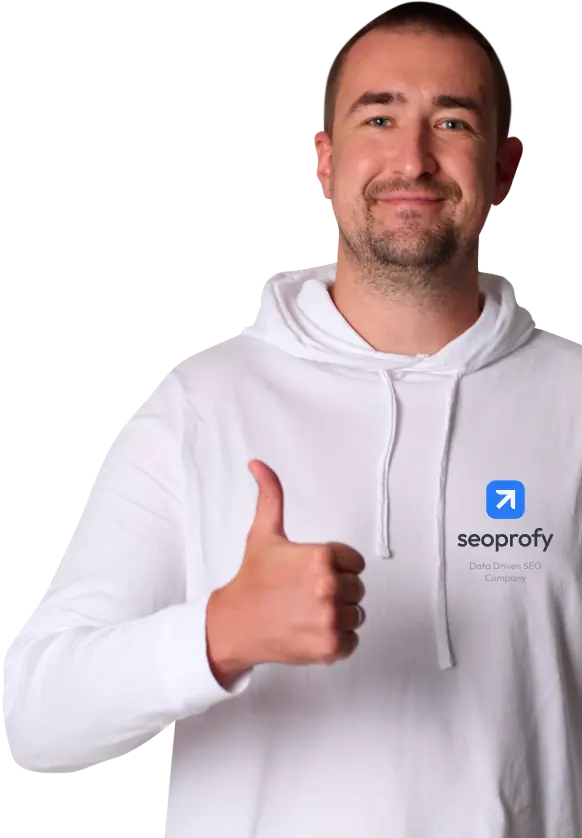
4. Work on Online Reviews
Every time someone leaves feedback about your company, it adds to the larger conversation happening online. AI models learn from that pool of content during training. So the more people write about you on forums and review sites, the better the model recognizes your name and connects it to relevant topics, and the easier it becomes to rank your website on ChatGPT.
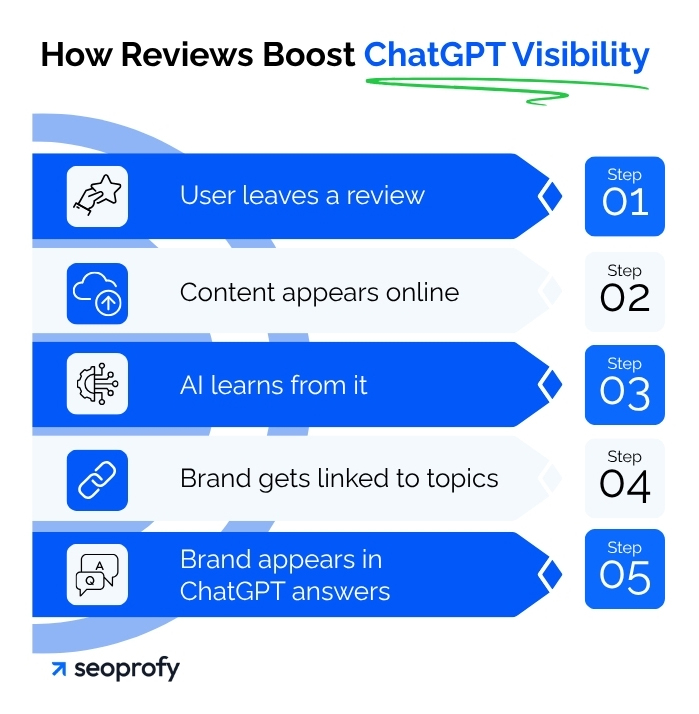
Reviews also teach AI systems what your product does and who it helps. For example, if your customers mention fast setup or how well your product integrates with other tools, those details get tied to your brand across AI responses.
The next time someone asks ChatGPT for “a CRM that works for small teams and connects easily with Slack,” those details nudge the model toward your name.
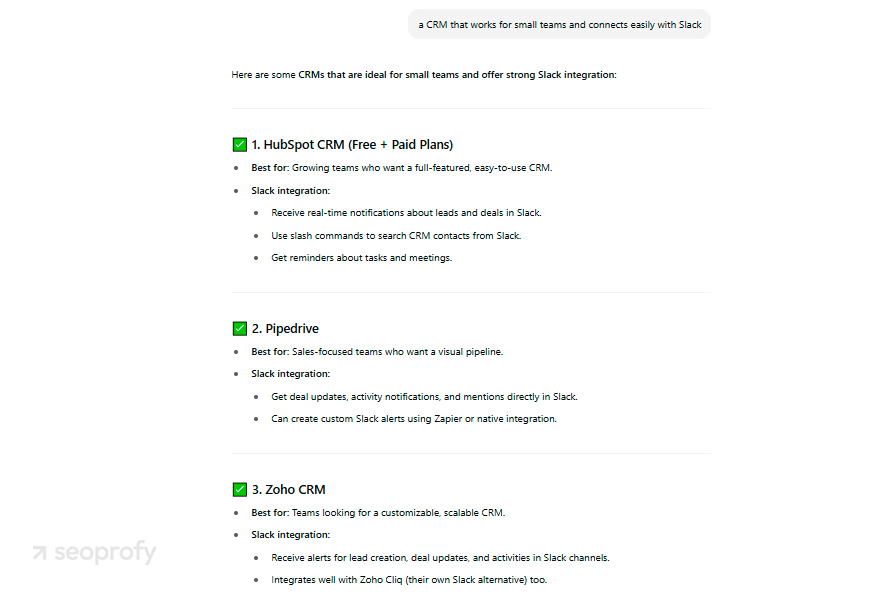
Another important thing to keep in mind is that ChatGPT pulls from patterns in the data it already has, including all the online conversations, lists, and reviews collected before the most recent update. That means the sooner you start building reviews, the more likely you’ll appear in answers over time. So what should you do?
- Ask customers for reviews that include details like why they chose your product, how they’re using it, and what changed after they did.
- Collect feedback on several platforms, for example, G2, Trustpilot, Capterra, and niche directories in your industry.
- Use feedback as ideas for your content. Take the most common questions or customer wins from your reviews and turn them into case studies, blog posts, or FAQ sections. This creates even more signals for AI to reference.
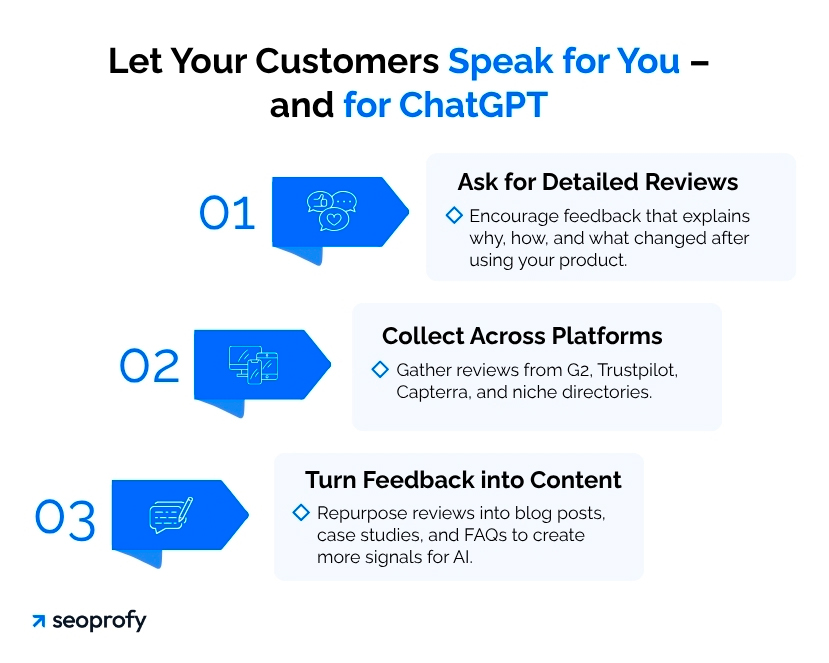
5. Create Content that ChatGPT Will Quote
You’ve probably already noticed that content marketing has taken on a new role. It no longer lives only in blog rankings or search results. Today, the content you publish feeds a much bigger ecosystem, and ChatGPT search is one of those places.
That said, AI tools look at content in a different way when deciding what to reference. Below, we’ll give you a high-level look at how LLM content ranking differs from traditional search.
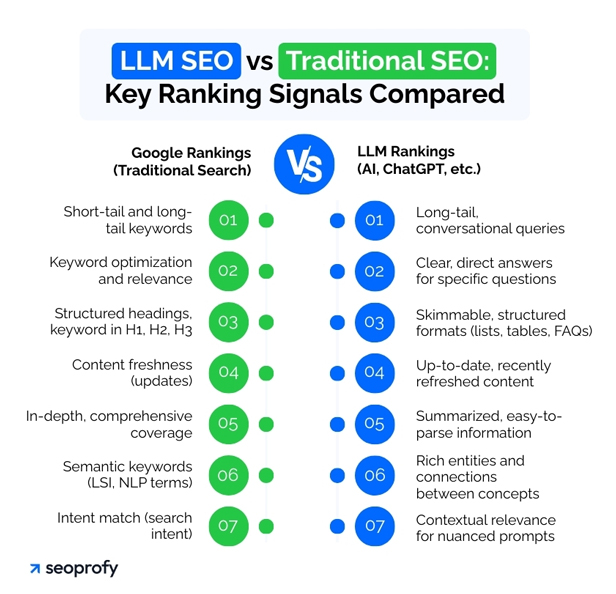
Now that you see what AI tools prioritize, let’s review the strategies that will help your content appear in AI-powered results.
Publish High-Quality, Authoritative Content
Content quality is not new and remains important for both Google and AI rankings. Latest Google algorithm updates prioritize it, and ChatGPT looks at how expert-written and relevant your information is before referencing it. This applies to both human-created and AI content for SEO.
How to do it:
- Cover your main topic fully. Answer all the related questions a user might have in subtopics.
- Use credible sources. Link to original studies, government data, or trusted industry resources to back up your claims.
- Include unique insights and, if possible, original data from your team. This could be research data, test results, or specific use cases that nobody else is sharing.
Write in a Clear and Concise Way
Large language models process text differently from search engines or human readers. They predict the answers based on patterns in their training data. And from what we’ve seen, short and well-structured paragraphs are easier for these models to recognize as complete thoughts, which raises the possibility that your content will get into ChatGPT responses.
How to do it:
- Use only one idea per paragraph.
- Break complex topics into steps or bullet points.
- Write direct answers under the headings (H2, H3, H4).
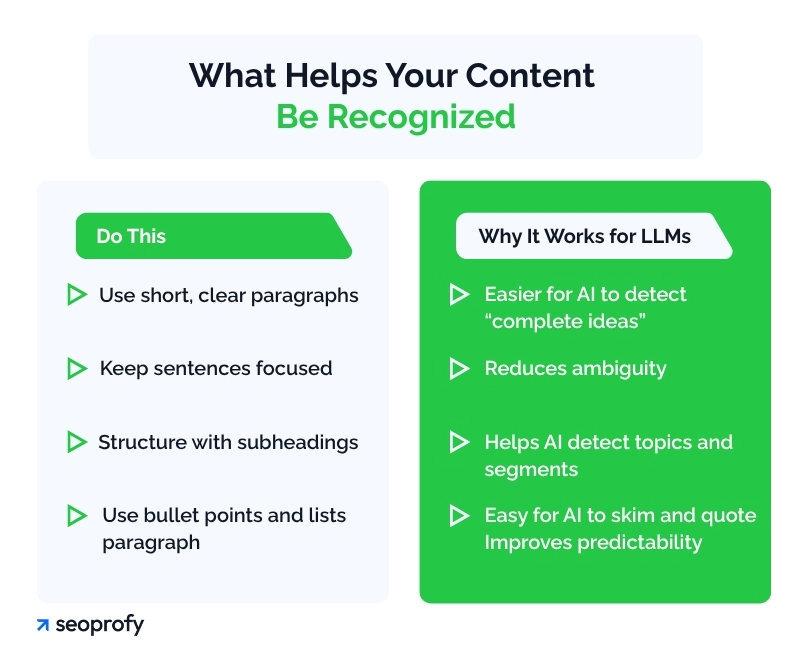
Use Natural Language and Keywords
People use natural language when they ask ChatGPT for help. They type the way they speak, and that’s exactly how AI models are trained to understand questions. Because of this, writing that mirrors how people think and speak becomes easier for these systems to connect to real search queries.
How to do it:
- Write in conversational sentences and work in keywords naturally.
- Use AnswerThePublic to see how people ask questions related to your product or service.
- Understand the search intent behind each query and write content that answers those user needs.
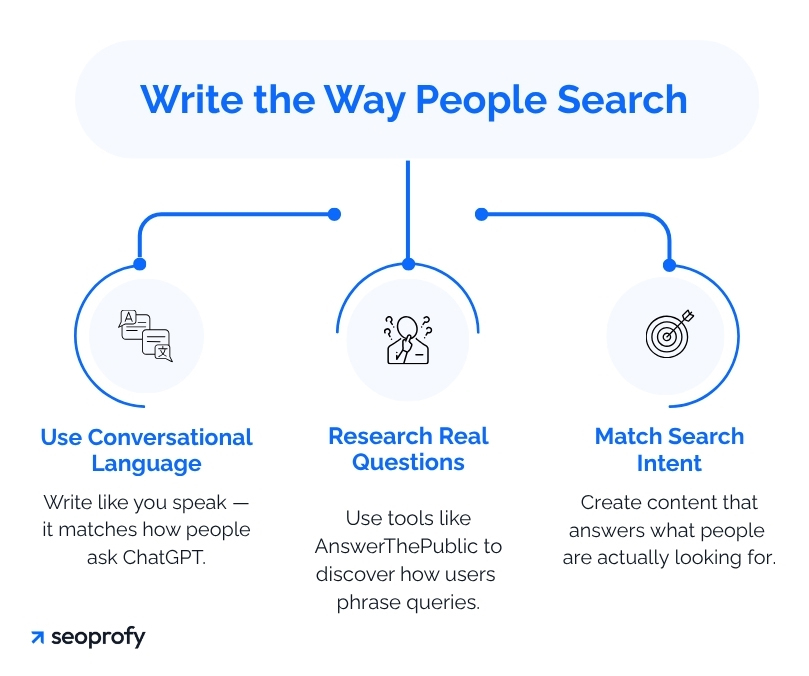
Optimize for Readability and Structure
AI tools like ChatGPT and Gemini process content in chunks. They look at sections, short paragraphs, and lists to understand what each part is about. Structuring your content this way makes it easier for the AI systems to link your page to the kind of queries people type. And from what we’ve seen, this approach is also one of the proven strategies to appear in Google AI Overviews.
How to do it:
- Keep paragraphs short, around three to four lines.
- Use bullet points or numbered lists for steps, features, or comparisons.
- Place important info near the top of pages and sections (AI often pulls from the first clear answers it finds).
- Add schema markup to give search engines and AI extra clues about your content.
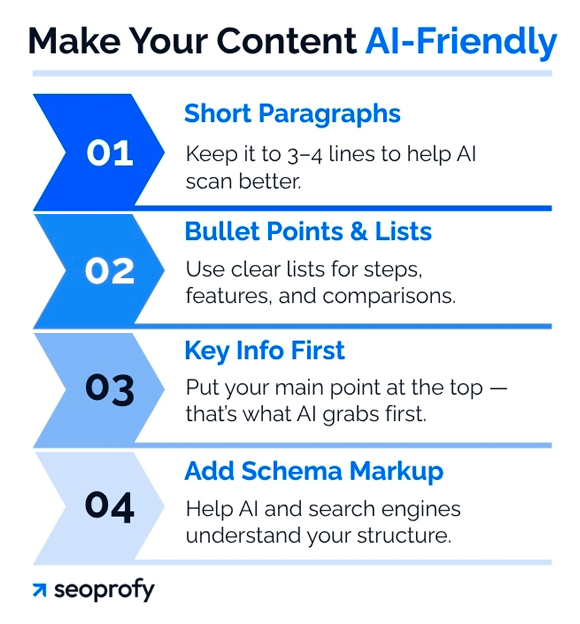
Regularly Update Your Content
One of the most common recommendations you’ll see on LinkedIn from people talking about LLM optimization is this: update your existing web content. And it keeps coming up for a reason. AI search engines pick sources based on real-time relevance and freshness. Google does this too.
Josh Blyskal’s recent study supports this point. He analyzed over 80,000 prompts across ChatGPT, Google AI Overviews, Microsoft Copilot, and Perplexity. The data shows that almost half of the domains cited by these answer engines were new, shifting within a single month.
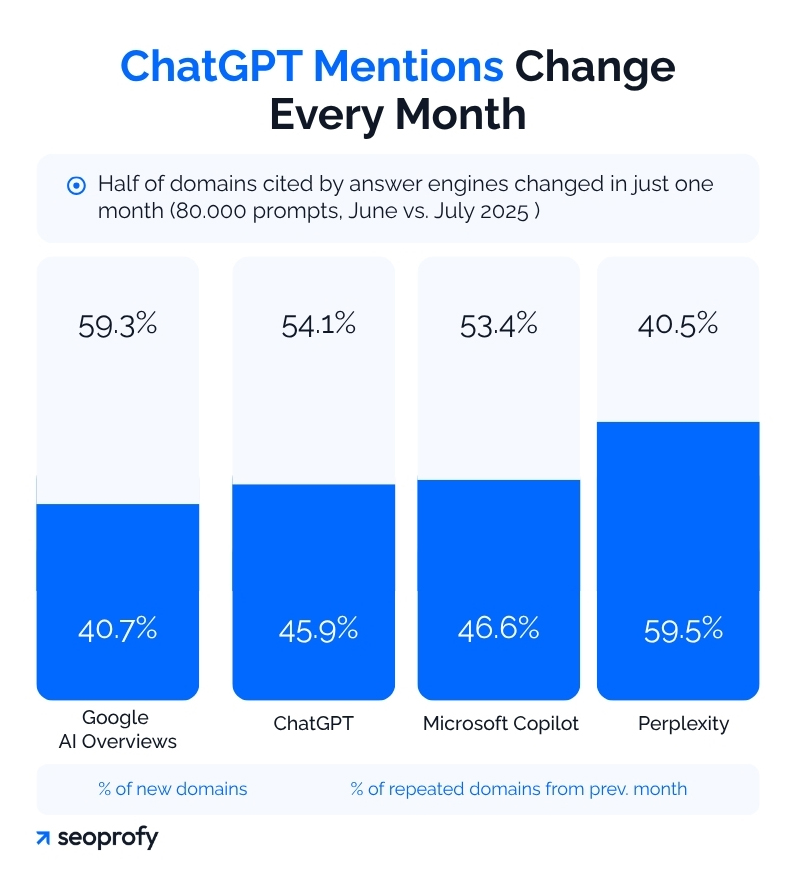
For businesses, this means relevance and freshness are going to be the number one priority when optimizing for ChatGPT, as AI models scan the web for the newest material that reflects current questions and conversations.
How to do it:
- Review and refresh your content regularly. Prioritize the pages you want answer engines to cite.
- Add new stats to your pages, update screenshots, or recent product news.
- Check which sources ChatGPT and other AI tools recommend for your topics.
Build a Content Ecosystem
With traditional SEO, almost all the content you create lives on your website. However, AI models are trained on various sources across the internet — websites, forums, social media, and other platforms. This is how they understand your overall topical authority and the context around your brand.
So, as a business owner, you need to design a marketing strategy that goes beyond the blog content on your site. We’re talking about email newsletters, subreddits, Quora answers, LinkedIn posts, and even podcasts. Each channel adds a piece to your overall presence and helps your brand get noticed by ChatGPT when answering questions.
How to do it:
- Publish relevant and informative content across different channels and formats.
- Share your expert insights and original data in communities and social platforms your audience visits.
- Link content within your site and reference it across platforms to build connections.
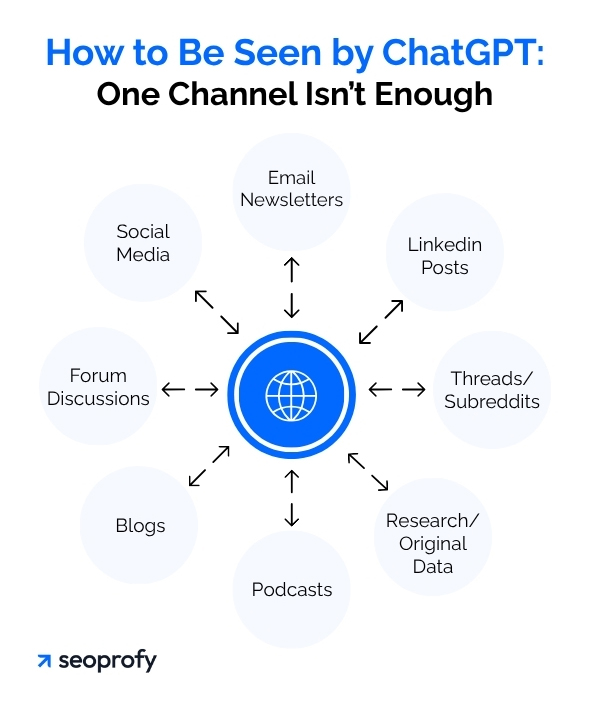
Create Interactive and Engaging Experiences
People don’t always want to scroll through 2,000 words to find an answer or make a decision. Sometimes they’d rather take a quiz or watch a video. These interactive elements keep people on the page longer, and that extra time helps your content rank higher on ChatGPT by signaling its value.
How to do it:
- Incorporate quizzes, custom tools, or polls in your pages.
- Use images, videos, or infographics to simplify complex ideas.
- Create step-by-step guides with visual walkthroughs to keep users engaged.
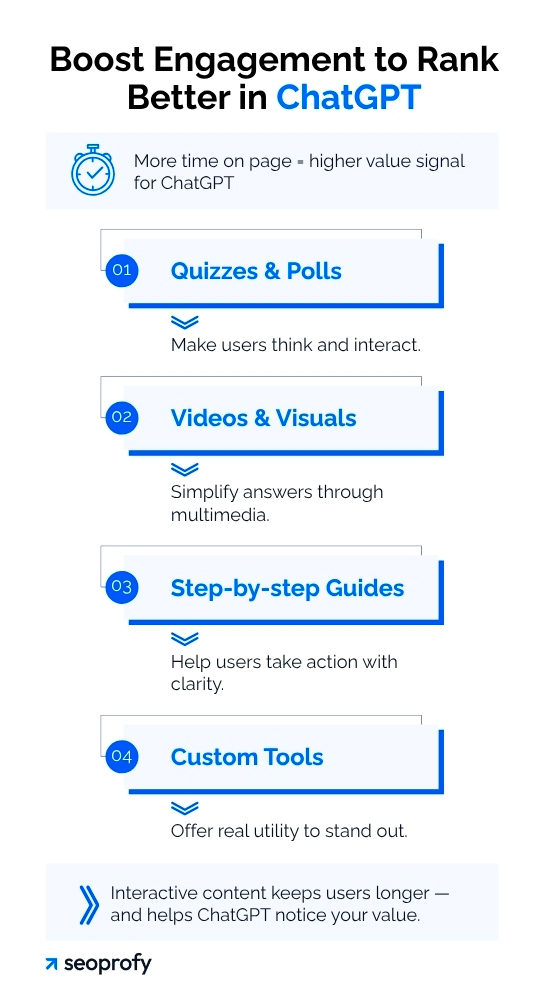
Use Performance Data to Refine Your Strategy
Making good content that drives SEO value starts with knowing what already performs well. The best tool for this is Google Analytics (GA4). You can use it to see which of your pages attracts the most visitors and which topics resonate with your audience.
How to do it:
- Monitor top-performing pages by traffic and engagement metrics
- Check which queries drive the most visitors to those pages
- Expand content around the topic that performed the best
Along with Google Analytics 4, it’s helpful to monitor where your brand already surfaces in ChatGPT. That brings us to our final section.
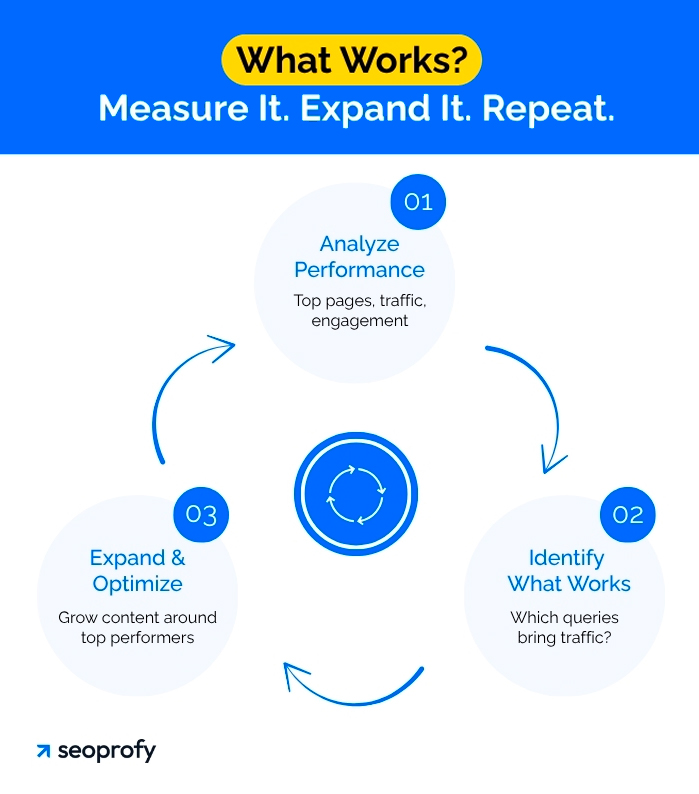
6. Track Your ChatGPT Mentions and Refine Your Strategy
Until recently, no AI SEO tools could show you when ChatGPT mentioned your brand. Luckily, that has changed thanks to Ahrefs’ recent update to Brand Radar. You can now track your brand’s prominence specifically inside ChatGPT and other AI tools like Perplexity. To try it out for yourself:
- Go to Ahrefs’ Brand Radar
- Select ChatGPT from the options
- Type in your brand name or a certain product or feature
- Press the Explore button to see the entire list.
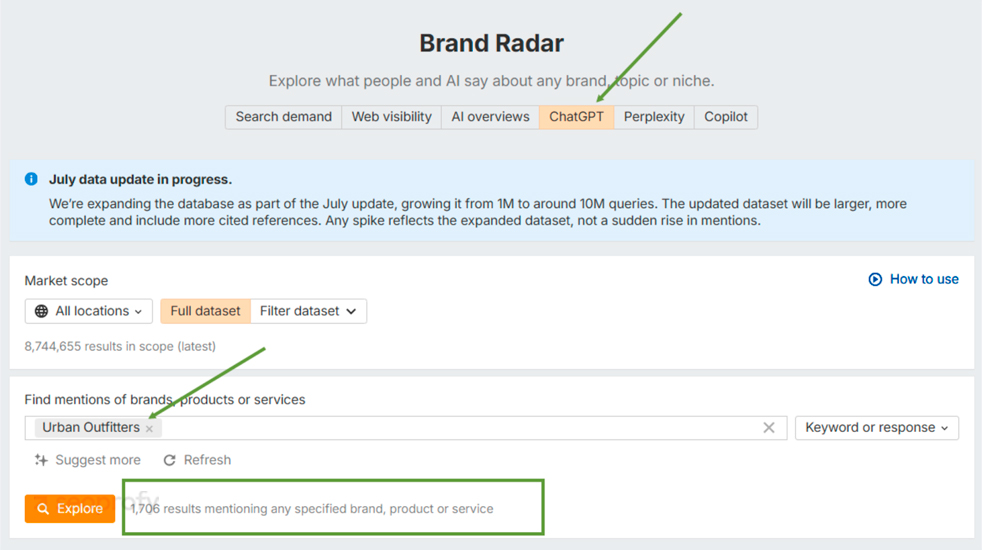
Similarly, in Ahrefs Site Explorer, you can see how many times your website is mentioned in ChatGPT right from the overview page.
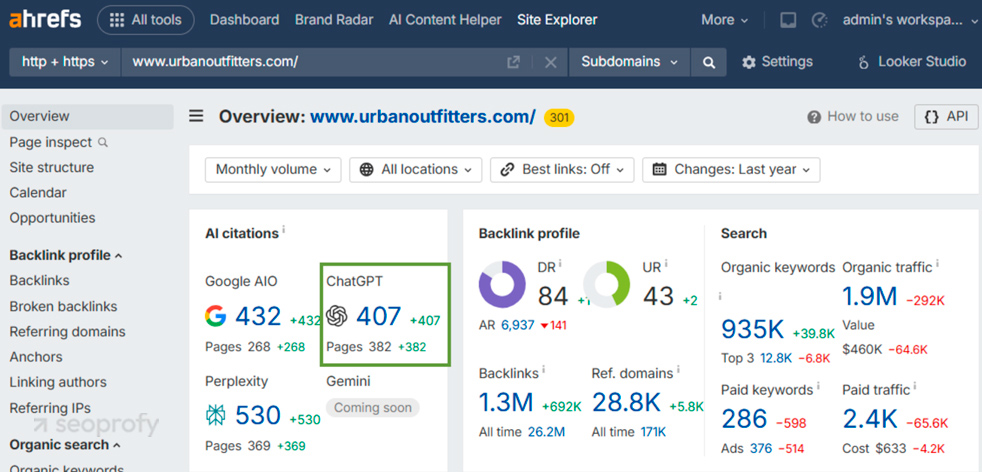
What’s great about this tool is that you don’t just get a count of mentions; you can also see which websites or domains are being cited the most, like reddit.com, wikipedia.org, and amazon.com.
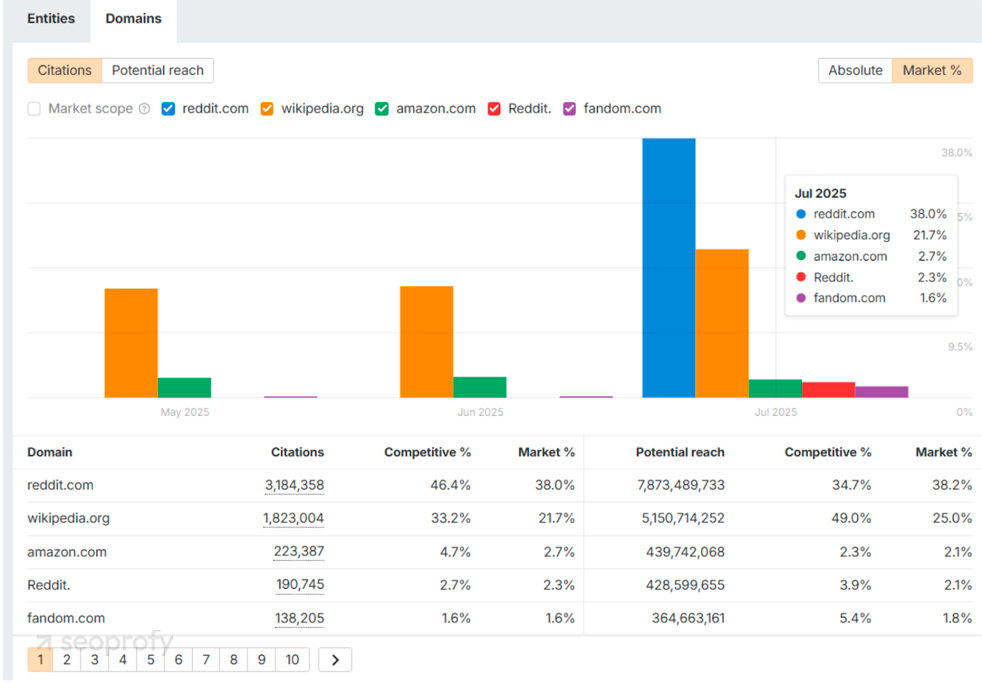
In addition to that, you can filter the results by specific keywords or phrases. In our case, we added “Urban Outfitters” to see exactly where the company name is being mentioned.
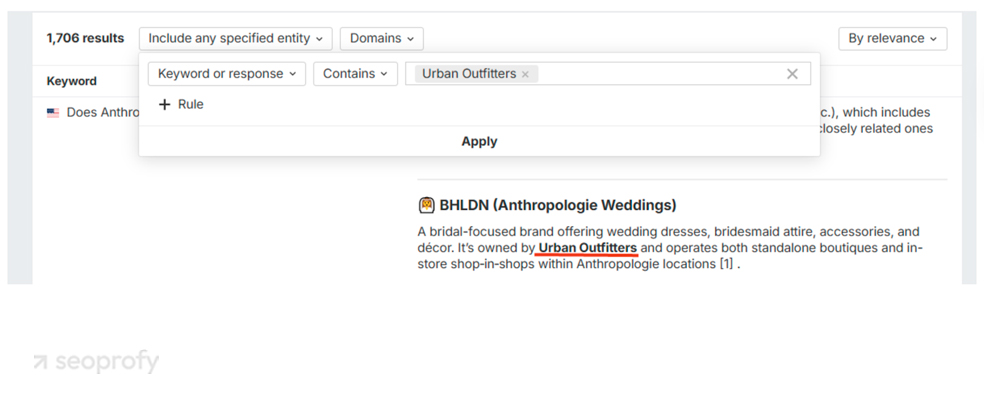
Once you filter, you get a list of user questions and responses where your brand appeared in a conversation. This gives you real-world examples of how ChatGPT talks about you and what your potential customers are asking.
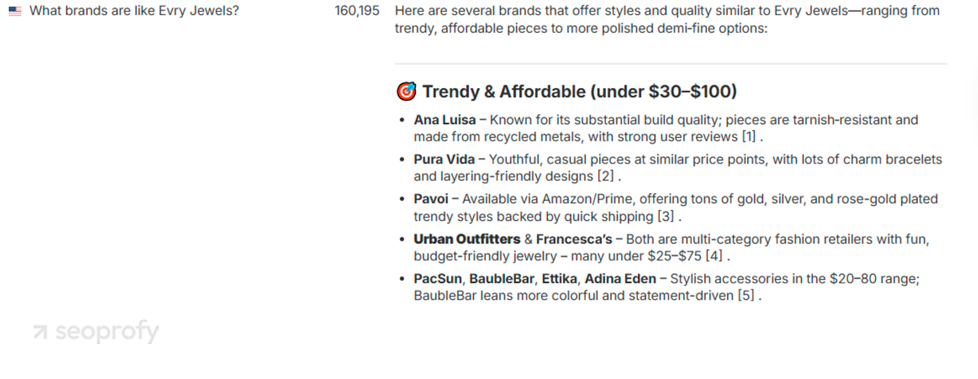
So what can you do with this data?
- Monitor how often your brand appears across AI-driven search platforms.
- See the specific questions or topics that reference you most.
- Notice changes in visibility trends over time.
- Refine your content and SEO strategies based on real-time data.
Stay Current with AI Trends
People no longer just type a few words into Google and click on links. They ask for advice directly inside AI tools and browse multiple channels to decide which products or services to buy. So learning how to rank in ChatGPT has become just as important as optimizing for traditional SEO.
For now, try testing a few ideas from this guide. Implement structured data (that’s where most wins seem to be coming from) and get your name mentioned on high-authority sites. Reddit and Quora are two of the best places to start because ChatGPT seems to reference them the most.
Here, at SeoProfy, we stay updated with recent trends and keep experimenting with new ways to show up in LLM tools. We’ve seen our website gain 35 new mentions in ChatGPT answers over the past few weeks, and our clients see similar wins through our AI SEO services.
If you’re ready to update your SEO for the way people search now, book a free consultation. We’ll help you build a strategy that fits the new world of LLM search.

